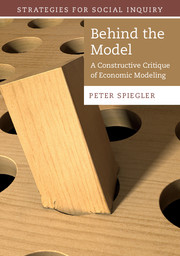7 - A reform proposal
from Part III - A reform proposal
Published online by Cambridge University Press: 05 December 2015
Summary
In the previous chapter, I argued that the presumption of modularity-stability of the target subject matter implied by mathematical-metaphorical modeling requires that those who seek to model social phenomena mathematically offer an account of the plausibility of this presumption. I argued further that this requirement differs significantly from other methodological issues that are well understood by economists, and I suggested the need for new research methods to address the requirement adequately.
This chapter expands on that suggestion by describing the kind of auxiliary work that must be done in economics in order for us to be confident that the kind of mathematical modeling commonly practiced in the discipline is relevant to the social phenomena it seeks to represent. Centrally, I propose the development of a new field within the discipline, the primary task of which would be to develop methods and standards for assessing the essential compatibility (or lack thereof) between economic models and their target subjects. We may call this field “interpretative economics.” Work in this area has already begun: giving it a distinct name only serves to concretize the crucial contribution that the field ought to make. Yet the name is incidental in a way the task is not. Without undertaking serious interpretative work to underpin economics as currently practiced, the suggestion that the kind of modeling pursued by economists has the capacity to illuminate human social action and interaction will remain a wish or fervent hope rather than a plausible claim. It would indicate the continued neglect of the testimony of the people who, in the words of Truman Bewley, actually “make economic decisions and observe and participate in economic life.” And that, in turn, would make economics “a religion rather than a responsible analysis of experience” (Bewley 1999: 14).
Hermeneutics and social categories of meaning
The main requirement of M-M mathematical economic modeling exercises in light of my critique, practically speaking, is that they include an account of the modularity-stability of the social objects and relations ostensibly represented by their mathematical models. In the previous chapter, I argued that determining the proper context within which to gauge the modularity-stability of social entities is complicated by the fact that social meanings are constructed dialectically, through the interplay of individual actions and the social norms and interpretive frameworks that give those actions meaning.
- Type
- Chapter
- Information
- Behind the ModelA Constructive Critique of Economic Modeling, pp. 165 - 194Publisher: Cambridge University PressPrint publication year: 2015



